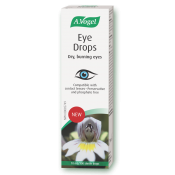What is hyaluronic acid?
Hyaluronic acid may sound like something that's brewed in laboratory with the sole purpose of melting plastic, but it's actually a type of polysaccharide, sometimes known as hyaluronan. Essentially, a polysaccharide consists of a number of sugar molecules that have bonded together into a long-chain carbohydrate.
So, rather than being an artificial concoction, hyaluronic acid is something naturally found in your body. Around 50% of it is in your skin, with the rest being spread throughout your connective and neural tissues. It's estimated that the human body contains around 15 g of hyaluronic acid in total and of this amount, 5g is turned over every day.1
The reason hyaluronic acid is now so popular is that it can act as a humectant, which means that it is able to retain moisture. In fact, it's thought that 1g of hyaluronic acid is capable of holding as much as one litre of water! When it comes to skincare, this factor is what lends hyaluronic acid its credibility, as it can help dry skin retain collagen and increase its production of moisture.
Hyaluronic acid also helps protect your muscles and joints, as it is found in the synovial fluid that helps cushion your bones and absorb shocks.
What are the benefits of hyaluronic acid for your eyes?
Your eyes rely on optimal levels of fluids in order to function properly—they need fluids to produce tears, absorb shocks, transport nutrients and protect delicate tissues. When your eyes lack fluids they can become dry, sensitive and easily irritable, and sometimes your vision can suffer.
As I mentioned above, hyaluronic acid is excellent at retaining moisture.
The structure of the central part of your eye, known as the vitreous humour, is primarily composed of this substance, which helps keep your eyes lubricated and replenishes lost moisture. One study even found that hyaluronic acid can help reduce oxidative stress in corneas affected by UV radiation.2
This is why, when your eyes are dry and aching, hyaluronic acid can come in handy. Drops are sometimes recommended, particularly for older eyes, as hyaluronic acid production slows with age.
Herbal helpers
When dry eyes occur, we call on our A.Vogel’s Eye Drops. They contain extracts of Euphrasia, commonly known as eyebright, in addition to hyaluronic acid. Extract of Euphrasia helps reduce inflammation, while the hyaluronic acid hydrates the connective tissues, keeping your eyes moisturized and enhancing the flow of nutrients.
References
1 https://organicbeautyandskin.com/what-is-my-skin-type/benefits-of-hyaluronic-acid.html
2 https://www.ncbi.nlm.nih.gov/pubmed/20860695





